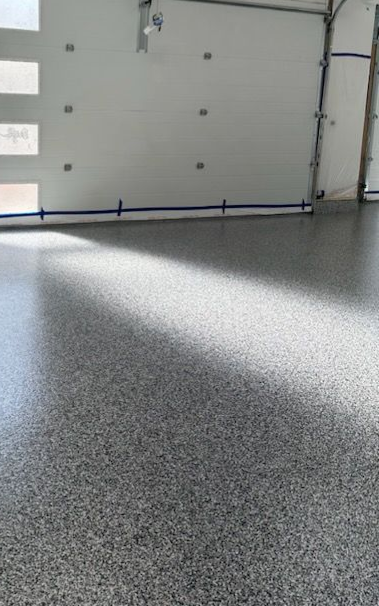
General Epoxy Flooring FAQs
-
What is epoxy flooring?
Epoxy flooring is a durable, protective coating made from a two-part system: resin and hardener. When combined, they chemically bond to your concrete, creating a smooth, glossy, and extremely tough surface.
Epoxy floors are ideal for garages, workshops, shops, and even commercial and industrial spaces because they resist stains, chemicals, and everyday wear. When installed correctly, an epoxy floor is both functional and visually appealing, giving you a surface that is durable and easy to clean.
-
Can epoxy be applied over existing floors?
Yes, epoxy can be applied over a variety of existing surfaces, including concrete, tile, wood, and even previously coated floors. The key is proper surface preparation.
The existing floor must be cleaned, repaired, and mechanically profiled (via grinding or shot blasting) to ensure the epoxy bonds correctly. Skipping these steps can lead to peeling, bubbling, or uneven coverage.
-
How long does it take for epoxy to cure?
Curing time depends on the product type, temperature, and humidity. Most epoxy floors will be walkable within 24 hours and ready for light use in 24–48 hours. Full chemical resistance and maximum hardness typically develop within 72 hours.
As professional installers, we monitor environmental factors closely to ensure the floor has cured appropriately so that you floors performs optimally.
-
Are epoxy floors slippery?
Epoxy floors can be slippery, particularly when wet. This is why we recommend adding anti-slip additives can improve traction.
-
How do I maintain my epoxy floor?
Maintenance is simple compared to uncoated concrete. Regular sweeping or vacuuming prevents dirt from scratching the surface, and occasional mopping with mild detergent keeps the floor looking new.
Avoid harsh chemicals or acidic cleaners, which can degrade the epoxy over time. A properly installed floor also reduces the need for resealing or refinishing, saving you time and money in the long run.
-
How long does epoxy flooring last?
Epoxy floors are extremely durable. In residential settings, properly installed floors can last 20–30 years, while commercial or industrial floors typically last 10–20 years depending on traffic and use.
Longevity depends on surface prep, correct application, and environmental conditions. This is why professional installation is so important, especially in climates like Alaska where moisture affects the concrete.
Epoxy Preparation & Installation FAQs
-
Is it necessary to test my concrete for moisture?
Moisture moving through concrete is one of the biggest causes of epoxy failure. That’s why a proper 72-hour calcium chloride test is essential.
This test measures how much moisture is coming through the slab over time, which is critical in Alaska’s unique climate. Skip it, and your floor could peel or bubble prematurely.
-
What is Concrete Surface Profile (CSP), and why is it important?
CSP (Concrete Surface Profile) measures how rough the surface is. Getting this right is critical for a strong, long-lasting epoxy bond.
We use diamond grinding to achieve the proper CSP every time. This ensures your epoxy adheres correctly and performs the way it should.
⚠️ Acid etching is not an approved surface prep method and should never be relied on.
-
What do you use for joint and crack repair?
Not all materials bond well with epoxy. Using the wrong patching products can lead to peeling or cracks reappearing.
We use epoxy-compatible repair materials designed to move with the concrete and form a permanent bond so that your floor stays smooth and strong.
-
How thick is the tinted primer coat the flake is broadcast into?
The primer coat is the base layer that surrounds and locks in the flake. If it’s applied too thin (a low mil thickness), the flake won’t be fully covered or bonded. That can create weak spots, rough patches, and premature wear.
We apply our tinted primer coat at the proper mil thickness recommended by coating manufacturers. This ensures every flake is encapsulated, giving you a seamless foundation for a floor that is beautiful and built to last.
-
If the floor is metallic, how thick is the coating, and does it get a topcoat?
Metallic epoxy floors require a minimum thickness of 25–27 mils to fully cover the primer and achieve a consistent, vibrant finish. We always install metallic coatings over a tinted primer coat, which prevents the concrete from showing through.
A topcoat is essential—it protects the metallic layer from wear, adds durability, and ensures the floor stays beautiful for years.